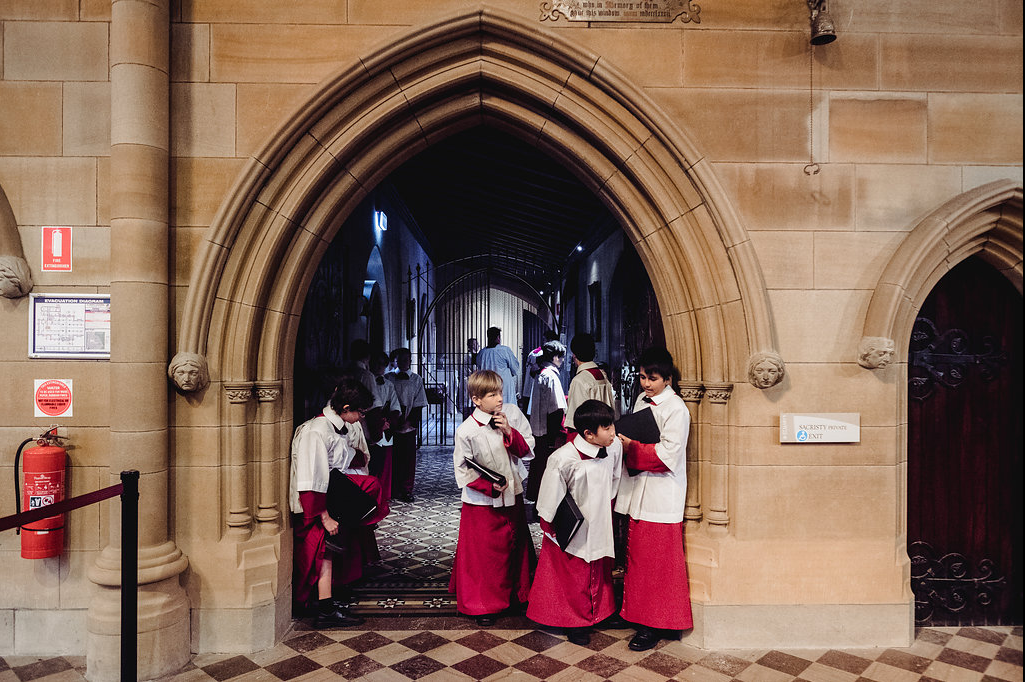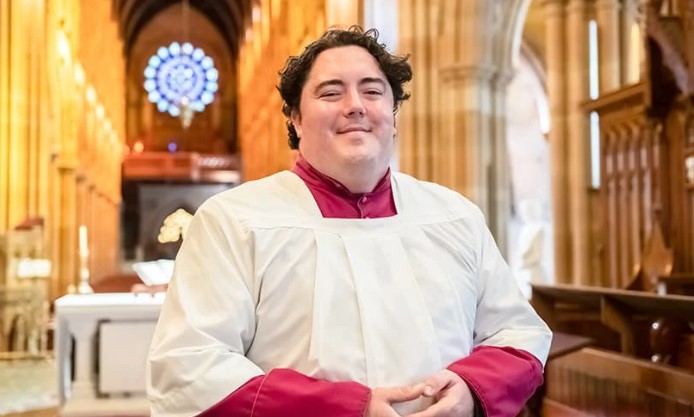Meet Andrew, Robert and Bede
The life of a Chorister at St Mary’s Cathedral is an experience unlike any other. Recently we sat down with a lay clerk and two boy choristers at the Cathedral to hear their experiences with all things life, laughter and song.
Bede and Robert are both boy Choristers at St Mary’s Cathedral, in Year 6 and 8 respectively. Andrew is a Lay Clerk at the Cathedral, and is a renowned Australian bass baritone who has toured extensively with the Cathedral Choir among other prestigious institutions, including the Pacific Opera and Australian Vocal Ensemble.

What is it like to be a chorister at St Mary’s Cathedral?
ROBERT (Yr 8): It’s very enjoyable! You get to be with lots of people and sing with them. It’s a diverse group, but we get on well.
BEDE (Yr 6): There’s a really good balance between free time and work time. We get treats like pancakes, baking and Oreos! We get to do things you wouldn’t normally do in school.
What does a day in the life of St Mary’s Cathedral singer look like for you?
ANDREW: As a Lay Clerk of the Cathedral Choir – a role that sits proudly alongside my freelance musical career – a typical day sees me engaged in various musical projects (performance or education) before making my way to the Cathedral in the afternoon for any one of the five to six services I would sing in a typical week. Some weeks are significantly busier!
These services can range in configuration – so I can either find myself alone or in a duo with an Organist, with my fellow Lay Clerks, mentoring and singing alongside the Cathedral Scholars, or singing with the full Cathedral Choir.
The music program at St Mary’s Cathedral is an extraordinarily rare thing in an Australian context – both in the quantity and quality of what we offer – and it engages a significant number of professional singers and organists every year in order to service the 400+ occasions that require music. I count myself fortunate to be one of them.
BEDE: On weekdays we have an hour-long, efficient rehearsal in the morning, then we go to school for 6 hours and then we have choir for 3 hours. It’s a long day but usually it’s worth it. On Sundays, we have choir [practice] from 9am to 12pm.
ROBERT: In the week, we have a rehearsal before school, then I go to school. After school, we have a rehearsal, get vested and have Mass. Then we go home.
Do you have a favourite composer? If so, who and why?
ANDREW: This is truly impossible to answer (I’m sure it changes in my mind hourly) but the Cathedral Choir sang Palestrina’s Missa Brevis just recently– a truly exquisite and finely wrought piece of music – so my answer will appropriately be Palestrina today!
What are your main challenges as a musician?
ROBERT: Chant is hard to learn at first as the notes and note lengths don’t make sense, but I can do it now.
BEDE: It’s really hard to be patient sometimes. I get frustrated easily. I like things to be fast moving and sometimes things take a long time. Sometimes I also want to do other things but I need to be rehearsing.
ANDREW: As a Church Musician, the biggest musical challenge is often around time. There is a significant level of skill, training, and experience required to work in a place as busy as St Mary’s Cathedral – where there is limited time (and sometimes none!) to rehearse and prepare what is sometimes very challenging music. Being adaptive, open, and relaxed in that circumstance is very important – and working together with your colleagues to use each other’s strengths to make the best music possible.
Do you have a favourite piece to sing? What is it, and why is that?
BEDE: My favourite is ‘Once in Royal David’s City’. I sang it at my audition to St Mary’s and I sang it as a solo when I was in Year 5. In the Christmas Concert in Year 5, Mr Wilson got us all to prepare it in advance and then at the start of the Concert he pointed to me and I had to perform it!
ROBERT: ‘O filii et filiæ’ is my favourite. It’s so fast paced and really dramatic. We sing it at Easter every year.
ANDREW: In the same vein as an earlier question this is almost impossible to answer – I imagine much like having to answer which child is your favourite as a parent! I’ll hedge my bets on a monumental work of J.S. Bach – his B Minor Mass. It’s a towering masterpiece of his style, and at least I’d have over an hour and a half of music to choose from.
How does music fit in with your other studies?
ROBERT: It fits in pretty well. I have a singing lesson once a week and a violin lesson once a week as well as the choir rehearsals and masses. In some of our choir free time after school, we have time to do our homework.
BEDE: As well as choir, I play the trumpet. I have enough time for it to work.

Image: Lay Clerk Andrew O’Connor
Have you been involved in other choirs, e.g. Cathedral Choirs, the Sixteen, Collegium Vocale, etc?. What was your experience like with other groups?
ANDREW: I have been singing in choirs from a young age, and in my professional life I’ve been lucky to sing with virtually every major ensemble in Australia. My church singing ‘career’ started in my local parish and continued whilst studying at the University of Western Australia, where I began singing with the St George’s Cathedral Choir and Consort which had (and has) a strong reputation. I also had some wonderful touring experiences with a university choir, The Winthrop Singers, and the National Youth Choir of Australia.
In 2015 I moved to Sydney to join The Song Company (which was at that point a full-time ensemble) and began singing with the St Mary’s Cathedral Choir shortly after. Since then I have sung in both ensemble and solo contexts with Pinchgut Opera, Cantillation, Bach Akademie Australia, Sydney Philharmonia Choirs, Australian Brandenburg Choir, Sydney Chamber Choir and more – and in 2021 I was invited to be a part of the Australian Vocal Ensemble (AVÉ) which is developing a national touring and recording schedule. Very recently I also had two wonderful opportunities to sing with the widely acclaimed VOCES8 and VOCES8 Foundation Choir and Orchestra.
The experiences I have with all of these choirs and ensembles is wonderful (and ongoing) but I still hugely value my time and role with the Cathedral Choir – and very much enjoy making beautiful music with my colleagues every week.
How do you see the relationship between faith (or religion) and music?
ANDREW: Music has a remarkable ability to lift us out of ourselves and to inspire reflection, emotion, a sense of ritual, and deep contemplation. It is unsurprising to me that it continues to play such a special role in elevating key moments of the liturgy – particular during Easter and Christmas.
Do you have a favourite liturgical season? If so, what and why?
ANDREW: The sequence from solemnity to splendour over Holy Week is truly special. Even more specifically my favourite Service is the Easter Vigil – and particularly the moment where the light from the Paschal Candle is dispersed throughout the Cathedral. It never fails to be breathtaking.
What are the joys of being a musician at the Cathedral?
BEDE: Getting to sing solos. It’s really fun and it’s an opportunity to prove yourself.
ROBERT: Mostly the music and the experience. I like being with other people
ANDREW: The joys of being a musician are manifold – but the biggest for me is the sense of connection and camaraderie you develop with your colleagues. I certainly feel that in the Cathedral Choir. Music is a powerful vehicle for communication (we know this from a Church Music context also) and it’s that special bond between the performers and audience (whether on stage or in the Cathedral) that always engages me. It also certainly keeps life interesting when every month or week brings a new musical program and new challenges.






